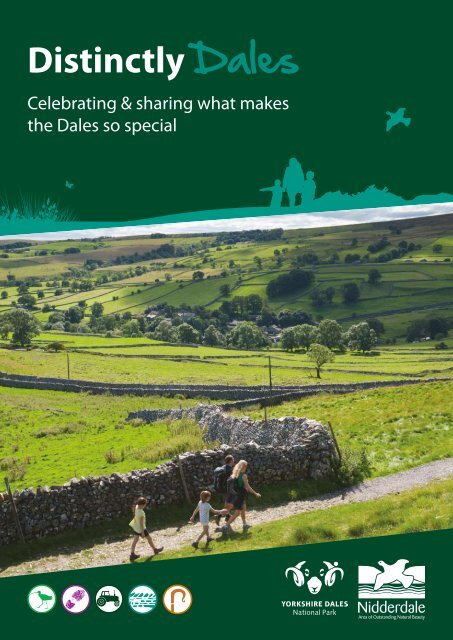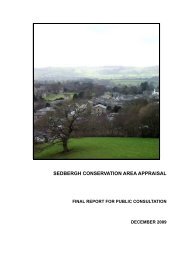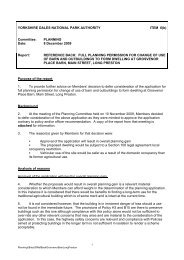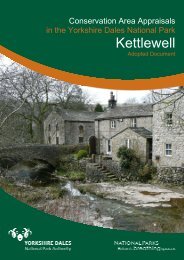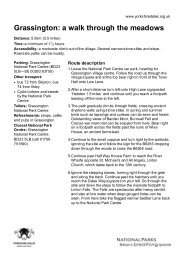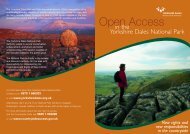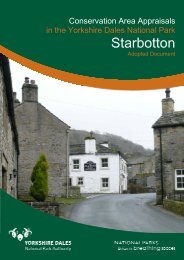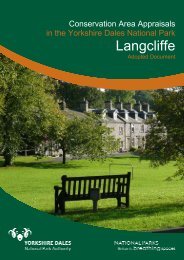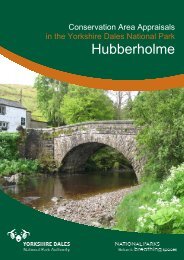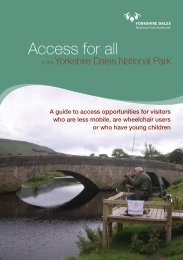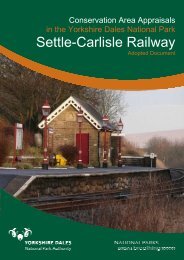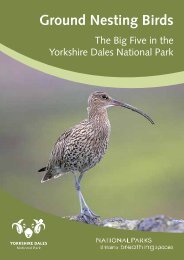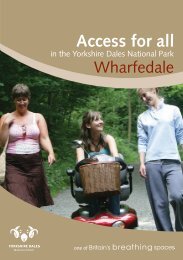Distinctly Dales toolkit - Yorkshire Dales National Park
Distinctly Dales toolkit - Yorkshire Dales National Park
Distinctly Dales toolkit - Yorkshire Dales National Park
You also want an ePaper? Increase the reach of your titles
YUMPU automatically turns print PDFs into web optimized ePapers that Google loves.
<strong>Distinctly</strong> <strong>Dales</strong><br />
Celebrating & sharing what makes<br />
the <strong>Dales</strong> so special<br />
2013 - 2018<br />
02<br />
<strong>Distinctly</strong> <strong>Dales</strong> 2012
Contents<br />
Introduction 4<br />
Three simple things we’d like you to do right now 5<br />
A brief history of the <strong>Yorkshire</strong> <strong>Dales</strong> 6<br />
Distinctive features of the <strong>Yorkshire</strong> <strong>Dales</strong> 8<br />
A special place for wildlife 12<br />
A selection of quirky traditions and legends 14<br />
Distinctive <strong>Dales</strong><br />
Around Swaledale and Arkengarthdale 17<br />
Around Wensleydale 18<br />
Around Nidderdale 21<br />
Around Dentdale and Sedbergh 22<br />
Around Ribblesdale and the Three Peaks 23<br />
Around Malhamdale 24<br />
Around Wharfedale 25<br />
Conclusion 27<br />
02 <strong>Distinctly</strong> <strong>Dales</strong> 2012 <strong>Distinctly</strong> <strong>Dales</strong> 2012 03
Introduction<br />
3 simple things we’d like you to do right now:<br />
Welcome to the <strong>Distinctly</strong> <strong>Dales</strong> Toolkit.<br />
Its purpose is to help you to use the special<br />
qualities of the <strong>Yorkshire</strong> <strong>Dales</strong> <strong>National</strong> <strong>Park</strong> and<br />
Nidderdale Area of Outstanding Natural Beauty<br />
(AONB) in order to improve the performance of<br />
your business.<br />
This document is just one of the tools that can help you to<br />
achieve this, and other useful resources are available<br />
through www.yorkshiredales.org.uk/sustainabletourism<br />
To make sure you receive updates on what is happening<br />
become a member of the <strong>Dales</strong> Tourism Business Network –<br />
you can find out more on www.dalestourism.com.<br />
The information in the <strong>toolkit</strong> has come from tourism<br />
businesses and local communities who, like you, are keen<br />
to think about why their place is special. That ‘place’ could<br />
be a village, a town, a dale – whatever felt personal to them.<br />
This was all part of a project funded by the <strong>Yorkshire</strong> <strong>Dales</strong><br />
<strong>National</strong> <strong>Park</strong> Authority and Nidderdale Area of Outstanding<br />
Natural Beauty who want to encourage more sustainable<br />
tourism in the <strong>Yorkshire</strong> <strong>Dales</strong>.<br />
The idea was to draw out the essential details, large and<br />
small, natural and man-made which combine to create a<br />
‘sense of place’.<br />
We considered:<br />
l Natural features such as the landscape, flora,<br />
fauna<br />
l Heritage, culture, traditions – people, events,<br />
festivals<br />
l<br />
Produce and industry – food, drink, crafts,<br />
farming, textiles<br />
l Man-made features like buildings<br />
l<br />
Words, dialect, local sayings, quirky<br />
anecdotes<br />
Marketing company, The Tourism Network was<br />
commissioned to undertake this <strong>Distinctly</strong> <strong>Dales</strong> project.<br />
The places, activities, information, and quirks in this <strong>toolkit</strong><br />
are a result of those events and your input.<br />
Please note this is not intended to be a comprehensive<br />
overview of everything that’s special about the <strong>Yorkshire</strong><br />
<strong>Dales</strong> <strong>National</strong> <strong>Park</strong> and Nidderdale Area of Outstanding<br />
Natural Beauty. There is far more information on our<br />
websites. These pages are just a sample of what’s on offer,<br />
distilled from the ideas and recommendations generated<br />
during the workshops that were held around the <strong>Dales</strong>.<br />
1<br />
2<br />
3<br />
Please use the description of your local area on your website.<br />
You are welcome to edit and change this. This version is just<br />
a starting point, developed to make it easier for everyone<br />
to move from saying “we’re in a lovely location” to actually<br />
giving more detail, attracting the right kind of visitor and<br />
encouraging them to stay longer and spend more. Consider<br />
what other additional information might interest your<br />
visitors and make sure you offer it, either on your website, in<br />
person or through special displays. Visitors really want this<br />
inside knowledge and so if you provide it, they won’t need to<br />
go elsewhere!<br />
Please signpost these websites and encourage visitors to use<br />
them:<br />
www.yorkshiredales.org.uk & www.nidderdaleaonb.org.uk<br />
The <strong>Yorkshire</strong> <strong>Dales</strong> <strong>National</strong> <strong>Park</strong> Authority and Nidderdale<br />
Area of Outstanding Natural Beauty have developed an<br />
enormous amount of more detailed information about the<br />
<strong>Yorkshire</strong> <strong>Dales</strong>, and we have lots of ways for visitors to enjoy<br />
being here. This includes ideas for short walks, cycle rides,<br />
events and guided walks, and phone apps and MP3 trails.<br />
Using the information on our websites will help your visitors<br />
get more out of their visit, and encourage repeat visits.<br />
Please read and use the practical handbook written to<br />
accompany this <strong>toolkit</strong>. It’s called Using Local Distinctiveness<br />
to Boost your Business. The handbook is available to tourism<br />
businesses working in, or close to, the <strong>National</strong> <strong>Park</strong> and<br />
Nidderdale AONB. If you don’t already have a copy please<br />
email susan@tourismnetwork.co.uk.<br />
It is not intended that businesses should copy and use all of<br />
this information, but we hope that you will pick and choose<br />
the most relevant bits for your business and location and use<br />
this as a starting point to provide more targeted information<br />
for your visitors.<br />
Thank you once again to everyone who got involved, offered ideas and<br />
encouragement. This project has generated so much enthusiasm, passion, and<br />
interest. We all know we live and work in a fantastic area – now it’s time to<br />
share more of it with our visitors.<br />
04 <strong>Distinctly</strong> <strong>Dales</strong> 2012 <strong>Distinctly</strong> <strong>Dales</strong> 2012<br />
05
A brief history of<br />
the <strong>Yorkshire</strong> <strong>Dales</strong><br />
A glance at a map of the <strong>Yorkshire</strong> <strong>Dales</strong> shows<br />
that the area is aptly named. The peaks rise to over<br />
700m (2,300ft) above sea level and large areas are<br />
over 600m (2,000ft) but the eye is attracted to the<br />
‘dales’, a Norse word for valley, which dissect the<br />
‘moors’ or ‘fells’.<br />
The rocks which dominate this landscape – limestone, shale,<br />
sandstones and millstone grit - were laid down as marine<br />
sediments in a period beginning about 350 million years<br />
ago. Older rocks survive in the Howgill Fells where erosion<br />
has produced a distinct and dramatic landscape of smooth,<br />
rounded hills and steep-sided valleys.<br />
All of the <strong>Yorkshire</strong> <strong>Dales</strong>, with the exception of some of the<br />
higher peaks, was covered with ice during the last glaciation.<br />
Once the ice sheets had melted and the climate began<br />
to warm, the landscape of the <strong>Yorkshire</strong> <strong>Dales</strong> gradually<br />
changed from open tundra to dense woodland. The people<br />
of this time (8000 BC) were hunter-gatherers, and evidence<br />
shows that open land around water sources such as Malham<br />
Tarn and Semerwater were important hunting areas.<br />
The first farmers appeared sometime after 5000 BC, clearing<br />
woodland to provide grazing for sheep, goats and cattle and<br />
somewhere to plant cereal crops.<br />
The Roman invasion of AD 43 brought profound changes<br />
to the economy and society of large parts of Britain. In the<br />
<strong>Dales</strong> there is evidence of a marching camp on Malham Moor<br />
and a permanent fort at Bainbridge linked to other sites<br />
by a typical straight road across the hills. However, Roman<br />
influence never seems to have penetrated very far into the<br />
<strong>Dales</strong>. Life for the mass of the native population probably<br />
went on much as it had done for their ancestors, and this way<br />
of life would have continued after the Romans left in AD 410.<br />
The next invasions came from northern Europe – with Saxon<br />
and Viking warrior-farmers coming to the area from Denmark<br />
and Norway. This Anglo-Scandinavian period continued<br />
through to the Norman invasion of 1066.<br />
The opposition to the rule of the Norman Duke William by<br />
northern landowners, led to a dreadful revenge called the<br />
Harrying of the North where estates were burned and crops<br />
and stock destroyed. In order to maintain control over their<br />
new territories, William’s landlords built castles. Castlehaw,<br />
near Sedbergh was an early example, followed by stone<br />
castles such as those at Skipton, Middleham and Richmond.<br />
Once settled, the Norman lords gradually began to give<br />
away their least profitable lands to the church in return for<br />
intercession in the next life. As a result, the great monastic<br />
houses like Fountains Abbey and Bolton Priory came to own<br />
three-quarters of the land defined by the boundary of the<br />
<strong>National</strong> <strong>Park</strong>.<br />
Mineral resources such as lead and coal were exploited as<br />
never before. Canals and better roads meant that farmers<br />
no longer needed to grow their own corn and during the<br />
eighteenth century more and more farmland was given over<br />
to grazing cattle and sheep. The numerous field barns of the<br />
<strong>Dales</strong> mostly date to this period.<br />
One of the greatest changes to take place in the countryside<br />
By came the about early years after 1539 of the with twentieth the Dissolution century, both of the the lead and<br />
the monasteries. coal industries The huge were monastic nearing their granges end were along broken with nearly up<br />
all and the a new textile class mills. of tenant Farming came continued to be established.<br />
as the backbone of<br />
the <strong>Dales</strong>’ economy, but the early 1900s saw the beginnings<br />
of During a rival the - tourism. seventeenth Back then, century, rambling the yeomen became farmers a popular of the<br />
leisure <strong>Yorkshire</strong> activity <strong>Dales</strong> with increased urban their workers fortunes yearning and for land the holdings, peace<br />
and usually quiet at the of the expense hills. of a growing class of landless poor.<br />
Further wealth plus work for the poor, was created through<br />
You the manufacture can discover of more knitted of textiles the history and the and exploitation archaeology of<br />
of mineral the <strong>Dales</strong> resources, on www.outofoblivion.org.uk.<br />
such as lead and coal.<br />
During the eighteenth and nineteenth centuries, the<br />
Industrial Revolution swept through the <strong>Yorkshire</strong> <strong>Dales</strong>.<br />
Small communities were transformed by the arrival of cotton<br />
and wool processing mills. Mineral resources such as lead<br />
and coal were exploited as never before. Canals and better<br />
roads meant that farmers no longer needed to grow their<br />
own corn and during the eighteenth century more and more<br />
farmland was given over to grazing cattle and sheep. The<br />
numerous stone field barns of the <strong>Dales</strong> mostly date to this<br />
period.<br />
By the end of the nineteenth century, both the lead and the<br />
coal industries were nearing their end along with nearly all<br />
the textile mills. Farming continued as the backbone of the<br />
<strong>Dales</strong>’ economy, but the early 1900s saw the beginnings of a<br />
rival - tourism. Back then, rambling became a popular leisure<br />
activity with urban workers yearning for the peace and quiet<br />
of the hills.<br />
You can discover more of<br />
the history and archaeology<br />
of the <strong>Dales</strong> on<br />
www.outofoblivion.org.uk<br />
06 <strong>Distinctly</strong> <strong>Dales</strong> 2012 <strong>Distinctly</strong> <strong>Dales</strong> 2012 07
Distinctive features<br />
of the <strong>Yorkshire</strong><br />
<strong>Dales</strong><br />
Over 20 named dales, cut by rivers, each distinctive in character and sense of place. Names like<br />
Swaledale, Wensleydale, Wharfedale, Ribblesdale and Dentdale are evocative and known to lovers of<br />
nature and outdoors throughout the country.<br />
Small, compact villages, hamlets and market<br />
towns with a strong sense of community and<br />
continuity.<br />
Unfenced roads across open moorlands with<br />
dramatic panoramas across the landscape and<br />
into the valleys below, and hay meadows, rich in<br />
grasses and wildflowers.<br />
Spectacular waterfalls, such as Hardraw Force,<br />
Aysgarth Falls, Cautley Spout and Thornton Force.<br />
A sense of tranquillity, enhanced by the natural<br />
sounds of wind, water and birdsong, and an<br />
amazing night sky, with dramatic effects from the<br />
moon, stars, and planets.<br />
Classic limestone scenery, with its crags, bare flat<br />
areas of rock known as pavements and extensive<br />
cave systems in the south of the <strong>National</strong> <strong>Park</strong><br />
and valleys with stepped profiles in the north,<br />
separated by extensive moorland plateaux.<br />
High winding moorland passes and heather<br />
tops: a great seasonal indicator when they change<br />
colour from brown to green, purple and white.<br />
Millstone grit outcrops such as Simon’s Seat and<br />
sandstone tors like Brimham Rocks.<br />
The Howgill Fells, a series of grassy rounded hills<br />
with deep ravines.<br />
Ruins and remains of the lead mining and the<br />
lime burning industry, particularly just below<br />
Coldstones Cut in Nidderdale and the Hoffmann<br />
Kiln between Langcliffe and Stainforth.<br />
Sheep!<br />
Look closer and you’ll eventually be able to spot the different<br />
breeds – Swaledale, <strong>Dales</strong>bred, Rough Fell, Texels and others.<br />
The influence of sheep is everywhere, from the grass terraces<br />
on the hills to the amazing architecture of great abbeys<br />
like Fountains and Jervaulx, built with the riches from wool<br />
and sheep farming. It is not surprising that the face of a<br />
Swaledale ram appears on the <strong>Yorkshire</strong> <strong>Dales</strong> <strong>National</strong> <strong>Park</strong><br />
signs. There are sheep dog demonstrations, opportunities to<br />
view lambing time and farms to stay on.<br />
Lines of dry stone walls<br />
There are over 8,500km of dry stone walls in the<br />
<strong>Yorkshire</strong> <strong>Dales</strong> so it is difficult to miss them.<br />
Look closely and you will see that there is a lot of variety. This<br />
can be due to the underlying geology, but the wall’s age and<br />
function also play a part<br />
A cross section through a typical dry stone wall shows it is<br />
A-shaped, with two outer faces formed of relatively large<br />
stones. The core is made up of smaller stones (hearting)<br />
which are often used to level up the face stones. Larger<br />
stones (throughs) are used to tie the two outer faces<br />
together. The top row are called coping stones.<br />
Walls can last a surprisingly long time, especially if they are<br />
built on a firm foundation. Over the years they tend to sag<br />
and slump but the loose nature of the filling means that<br />
collapses can be easily rebuilt and a good dry stone waller<br />
can build five metres a day.<br />
08 <strong>Distinctly</strong> <strong>Dales</strong> 2012 <strong>Distinctly</strong> <strong>Dales</strong> 2012 09
Traditional stone-built field barns<br />
Field barns or laithes are a distinctive feature of the<br />
<strong>Yorkshire</strong> <strong>Dales</strong> landscape. Barns were used as a<br />
combination of cattle housing and fodder storage.<br />
You’ll notice that most are in fields and hay meadows, away<br />
from main farm buildings. Hay was stored on the first floor,<br />
ready to feed the cattle on the lower floor. Muck from the<br />
cattle could then be spread on the hay meadows ready for<br />
the next crop. This saved farmers the effort of<br />
carrying hay or muck to and from the main farmstead.<br />
Before the early eighteeth century many of these had<br />
wooden cruck frames and a heather thatched roof. You can<br />
see a fine example in Wharfedale at Grimwith High Laithe<br />
next to Grimwith Reservoir.<br />
In places like Upper Swaledale where winters can be more<br />
severe, you’ll also find some hogg houses, built to overwinter<br />
young sheep or hogs.<br />
Caves and crags<br />
The <strong>Yorkshire</strong> <strong>Dales</strong> is a fantastic destination for<br />
those who want to enjoy caving, climbing, walking<br />
and exploring unusual geological features.<br />
Visitors can safely explore the crags and caves of the <strong>Dales</strong><br />
with a guiding company or visit a show cave. Here are just a<br />
few examples:<br />
Caves<br />
Kingsdale Master System, Gaping Gill System and Alum Pot<br />
on the slopes of Ingleborough, and Hull Pot and Hunt Pot<br />
underneath Pen-y-ghent.<br />
Show caves<br />
Ingleborough Cave near Clapham and White Scar Caves near<br />
Ingleton, How Stean Gorge in Nidderdale, and Stump Cross<br />
Caverns at Greenhow.<br />
Crags, gills and other distinctive features:<br />
• Malham Tarn and Semerwater<br />
• Malham Cove and Gordale Scar<br />
• Dry valleys such as above Malham Cove<br />
• Sink holes such as Braithwaite Wife Hole and Churn Milk<br />
Hole<br />
• Thieves Moss in Crummackdale<br />
• Beggar’s Stile<br />
• Limestone pavements at Malham, Selside, Oxenber,<br />
Moughton<br />
• Norber erratics near Austwick<br />
• Drumlins between Coniston Cold and Hellifield and south<br />
of Ribblehead<br />
• Castleberg Crag above Settle<br />
• Brimham Rocks near Pateley Bridge<br />
• Fremington Edge above Reeth<br />
• Great Shunner Fell<br />
• The Three Peaks – Ingleborough, Pen-y-ghent and<br />
Whernside<br />
• Cracoe reef knolls<br />
• Earl’s Seat and Simon’s Seat on Barden Fell<br />
• Kilnsey Crag<br />
• Troller’s Gill near Appletreewick<br />
• Buttertubs Pass between Hawes and Muker<br />
Waterfalls<br />
The <strong>Yorkshire</strong> <strong>Dales</strong> is famous for the sheer number<br />
and variety of its dramatic waterfalls – seeing them<br />
is a great wet-weather activity.<br />
• Stainforth Foss/Force: a picturesque waterfall where the<br />
salmon leap on their way upstream to spawn.<br />
• Janet’s Foss: a small and pretty waterfall near Malham.<br />
• Ingleton waterfalls: a trail takes in a series of lovely<br />
waterfalls.<br />
• Catrigg Force: a hidden gem located in a small wooded<br />
copse one mile upstream from Stainforth village.<br />
• Force Gill Waterfall: an often overlooked beautiful 6 metre<br />
waterfall just a short detour from the Three Peaks route<br />
between Ribblehead Viaduct and Whernside.<br />
• Aysgarth Falls and Cotter Force in Wensleydale both of<br />
which can be seen using easy access footpaths.<br />
• Hardraw Force – the longest single drop waterfall in<br />
England: pay at the Green Dragon pub.<br />
• Scaleber Force<br />
• East Gill Force<br />
• Catrake Force<br />
• Richmond Falls<br />
• Kisdon Force<br />
• Wain Wath<br />
• Cautley Spout: in the Howgills<br />
10 <strong>Distinctly</strong> <strong>Dales</strong> 2012 <strong>Distinctly</strong> <strong>Dales</strong> 2012 11
A special place for<br />
wildlife<br />
The <strong>Yorkshire</strong> <strong>Dales</strong> <strong>National</strong> <strong>Park</strong> and Nidderdale<br />
Area of Outstanding Natural Beauty are special<br />
places for wildlife including many rare species<br />
of plants and birds. They are important breeding<br />
grounds for many birds, including grouse, curlew,<br />
lapwing and skylarks – which nest on the<br />
ground. There are heather moorlands, famous<br />
wildflower meadows, limestone pavements and<br />
species-rich limestone grassland.<br />
In springtime look out for:<br />
• the return of the curlew with its beautiful call<br />
• the spring lambs<br />
• the tumbling display flight of the lapwings<br />
• the oystercatchers with their long, bright orange beaks<br />
• the woodland flowers – bluebells, wild garlic and lily-ofthe-valley<br />
- in Grass Woods or at Hackfall Woods<br />
In summer:<br />
• Walk one of the paths through a hay meadow as they<br />
come alive with flowers<br />
• Take the chance to see the spectacular peregrine falcons<br />
at the public viewpoint at Malham Cove<br />
• Hear the chatter of swallows and watch as they swoop<br />
low over rivers and meadows to catch insects<br />
• See the heather moorlands turn purple as they come<br />
in to flower<br />
In autumn:<br />
• More pheasants and grouse can be seen as the shooting<br />
season begins<br />
• You can pick some blackberries for tea<br />
• See the salmon make their way up river to spawn and<br />
watch them jumping up the falls on the Ribble and<br />
Wharfe<br />
• Witness tupping time at the end of the season when<br />
rams (male sheep) are put to work to produce next year’s<br />
spring lambs<br />
.<br />
For many more details about<br />
these precious habitats and to<br />
find out more about our wonderful<br />
wildlife, as well as many ways to<br />
understand them better,<br />
please visit<br />
www.yorkshiredales.org.uk and<br />
www.nidderdaleaonb.org.uk<br />
12 <strong>Distinctly</strong> <strong>Dales</strong> 2012 <strong>Distinctly</strong> <strong>Dales</strong> 2012 13
A selection of<br />
quirky traditions<br />
and legends<br />
The <strong>Dales</strong> are full of curious stories and folk tales<br />
passed down the generations which stir the<br />
imagination. Here are just a few of them.<br />
According to tradition, the people of Austwick saw the<br />
cuckoo as the harbinger of spring and good weather and so<br />
when one roosted in a tree they built a wall around it in the<br />
hope of keeping it there. Unfortunately the wall wasn’t high<br />
enough so the cuckoo simply flew away…A Cuckoo<br />
Festival is still held there in summer.<br />
Malham Safari takes place over eight days in May when<br />
the villagers and local school build themed sculptures all<br />
around the village.<br />
The Tosside Fox Festival is held in July when families and<br />
businesses make a fox and dress it to a theme before putting<br />
it on public display. In Kettlewell the Scarecrow Festival<br />
sees quirky and often intricate models around the village.<br />
Held at The George Inn in Hubberholme, the annual landletting<br />
auction is known as the Hubberholme Parliament<br />
and is on the first Monday night of the year. It dates back<br />
centuries. Local farmers gather to bid for 16 acres of<br />
pastureland owned by the church, the proceedings of which<br />
go to help the poor people of the parish. The vicar oversees<br />
the auction and sits in the ‘House of Lords’ (dining room)<br />
while the bidding takes place in the ‘House of Commons’ (the<br />
bar). The highest bid made when the candle flickers out wins<br />
the auction.<br />
The Barguest is a legendary monstrous black dog with<br />
huge teeth and claws said to frequent Troller’s Gill in<br />
Wharfedale and rumoured to be the inspiration for Sir Arthur<br />
Conan Doyle’s Hound of the Baskervilles.<br />
The nooks, caves and crannies of Troller’s Gill are also said<br />
to be the home of trolls and perhaps other sorts of similarly<br />
diabolical and fiendishly unpleasant beings lying in wait for<br />
the unsuspecting rambler...<br />
A grisly event took place in Grassington in April 1766, when<br />
local blacksmith Tom Lee killed Dr Richard Petty. The doctor<br />
had treated his wounds following a robbery and threatened<br />
to expose him to the authorities.<br />
Mary, Queen of Scots, was imprisoned at Bolton Castle in<br />
1568. She would appear to have been well treated – taking<br />
the best apartments and having a retinue including cooks,<br />
grooms, hairdresser, embroiderer, apothecary, physician and<br />
surgeon.<br />
Clapham’s man-made lake was expanded in the nineteenth<br />
century, and provided pressure for water turbines to supply<br />
electricity to the Ingleborough Estate, apparently making<br />
Clapham the first village to have electric street lighting.<br />
Tunnels were reputedly built over Thwaite Lane near<br />
Clapham so the Farrer family from Ingleborough Hall could<br />
enjoy their estate and lake without having to see people<br />
using this popular drovers’ route!<br />
In Swaledale, tradition has it that the dead were carried in<br />
wicker coffins down the dale for burial in the churchyard at<br />
Grinton. The paths used became known as the Corpse Way.<br />
For many hundreds of years the burial ground at Grinton<br />
was the only consecrated ground in the dale – if you were<br />
not buried in consecrated ground your soul was damned<br />
for eternity. A number of long flat stones have been found<br />
along the route, such as at Ivelet Bridge, and these were<br />
supposedly where the wicker biers were placed while the<br />
pall bearers rested.<br />
In 1692, Adam Barker was the last person in Swaledale<br />
to be fined for sticking to the local tradition of burial in<br />
linen, breaking the law which required bodies to be buried<br />
in wool, in order to support Britain’s wool industry. His<br />
daughter, Ann, is buried inside Grinton Church, and a stone<br />
slab records the £5 fine he was forced to pay.<br />
Neddy Dick was the nickname of Richard Alderson of Keld<br />
who died in 1927. His fame spread far and wide in the dales<br />
after his creation of a musical ‘rock’ instrument, made of<br />
limestone rocks fashioned to sound a full scale of notes<br />
when hit with a special hammer. He took it around the local<br />
shows and fairs, to the great delight of all who heard it.<br />
The so-called Terrible Knitters of Dent were the most<br />
famous hand knitters of the <strong>Dales</strong>. Their amazing skill is<br />
recounted in full at the Dent Village Heritage Centre, and<br />
there are displays of the special tools involved both there<br />
and at the <strong>Dales</strong> Countryside Museum in Hawes.<br />
George Hodgson of Dent died in 1715 aged a remarkable<br />
94, and his grave can be seen infront of the church porch.<br />
Years before his death, there were many rumours about his<br />
health and longevity, attributing it to dealings with the Devil<br />
and vampires. A popular story surrounds a small piece of<br />
metal buried in the gravestone which is said to be the end<br />
of a stake driven through George’s heart. Unfortunately,<br />
the truth is simpler – it is only the remains of a brass plaque<br />
which had been attached to the stone.<br />
In common with many bridges of the same name, legend<br />
holds that at the Devil’s Bridge in Kirkby Lonsdale, the<br />
Devil appeared to an old woman, promising to build a bridge<br />
in exchange for the first soul to cross over it. When the bridge<br />
was finished the woman threw bread over the bridge and her<br />
dog chased after it, thereby outwitting the Devil.<br />
14 <strong>Distinctly</strong> <strong>Dales</strong> 2012 <strong>Distinctly</strong> <strong>Dales</strong> 2012 15
Distinctive <strong>Dales</strong><br />
Around Swaledale<br />
and Arkengarthdale<br />
Each of the valleys that make up the <strong>Yorkshire</strong> <strong>Dales</strong> is different, in both landscape, history and<br />
tradition. This section pulls together a few of those key aspects to bring out that distinctiveness of<br />
the main dales and a number of key towns.<br />
As James Herriot wrote, “… on the empty moors,<br />
with the curlews crying, I have been able to find<br />
peace and tranquillity. It is a land of pure air, rocky<br />
streams and hidden waterfalls.”<br />
The River Swale is one of England’s fastest rising spate rivers,<br />
rushing its way between Thwaite, Muker, Reeth and on to<br />
Richmond. At the head of Swaledale is the tiny village of<br />
Keld, the crossing point of the Coast to Coast Walk and the<br />
Pennine Way long distance footpaths. Keld was once a more<br />
populous place at the peak of the leadmining boom. Learn<br />
some of its history at the Keld Countryside and Heritage<br />
Centre.<br />
Moving further north, the moors start to take over and the<br />
landscape becomes wilder and more remote. Arkengarthdale<br />
is perfect for those who prize their solitude, unless they want<br />
to sample local beers at England’s highest pub at Tan Hill.<br />
On the moors you’re likely to see the small, shaggy and<br />
hardy Swaledale sheep. They are key to the livelihood of<br />
many <strong>Dales</strong> farmers and the emblem for the <strong>Yorkshire</strong> <strong>Dales</strong><br />
<strong>National</strong> <strong>Park</strong>.<br />
In the lower areas, you’ll see tranquil hay meadows (at their<br />
best in the early summer months) bordered by a myriad<br />
of dry stone walls and punctuated by field barns. The hay<br />
meadows are filled with wildflowers, insect and bird life.<br />
It’s hard to believe these calm pastures and wild moors were<br />
ever a site for industry but at Gunnerside Gill you can still<br />
see the remains of the former leadmining industry. Find out<br />
more about local life by visiting Swaledale Museum in Reeth<br />
or Hazel Brow Farm.<br />
Many people will recognise a special part of Swaledale from<br />
the title sequence of the TV series All Creatures Great and<br />
Small, when Siegfried’s car splashes through the stream. This<br />
beautiful spot sits in a dip in the moors beside the minor<br />
road from Low Row to Arkengarthdale, and is the perfect<br />
place to relax and take in the scenery while you enjoy a<br />
picnic of delicious local food.<br />
Swaledale’s main town is Richmond, where the 100ft high<br />
Castle walls and sloping cobbled market place dominate<br />
the town. The Georgian Theatre has an intimate feel and<br />
fascinating history and at nearby Richmond Station you can<br />
enjoy a film and visit six artisan food producers.<br />
Don’t leave Swaledale and Arkengarthdale<br />
until you’ve…<br />
• Taken your own classic Swaledale view on a Camera<br />
Ramble with the friendly folk from Scenic View Gallery<br />
• Swooped down some of the Swaledale hills on two<br />
wheels from the <strong>Dales</strong> Bike Centre, Fremington (you<br />
might want to sample their excellent cake first)<br />
• Enjoyed a Friday night drink with the colourful locals at<br />
the Punchbowl – and tasted the chips from the fish and<br />
chip van!<br />
• Learnt some natural navigation skills with Mark Reid and<br />
his colleagues at Team Walking<br />
• Tried your hand at fly fishing on the Swale with the<br />
angling club at Reeth<br />
• Watched some world class running at one of the<br />
agricultural shows’ fell races or the Swaledale Offroad<br />
marathon in June.<br />
• Been to the sheepdog trials at the Muker Show<br />
• Had some wonderful food at one of the CB Inn’s<br />
Specialty Nights<br />
• Bought a locally-made woollen jumper from Swaledale<br />
Woollens<br />
• Been pony trekking with the Arkle Moor Riding Centre at<br />
Reeth<br />
• Followed the Corpse Way and learnt its grim story<br />
• Bought some Damson Cheese from Garden House<br />
Pottery in Reeth<br />
• Visited Swaledale Museum and had a glimpse into the<br />
past working life of the dale<br />
• Bought an original artwork from one of the many artists<br />
in Swaledale<br />
• Gone outward bound at Marrick Priory<br />
• Visited the award winning Hazel Brow Farm, met the<br />
animals including the Swaledale sheep, and bought some<br />
local cheese<br />
• Stopped for a drink at the Tan Hill Inn and admired the<br />
view from the country’s highest pub<br />
• Given your dog a treat at the King’s Head in Gunnerside<br />
where they serve a special beer for dogs<br />
• If your dog doesn’t deserve a treat, then don’t leave until<br />
you’ve taken a special training session with Clare Ackroyd<br />
at Healthidog<br />
16 <strong>Distinctly</strong> <strong>Dales</strong> 2012 <strong>Distinctly</strong> <strong>Dales</strong> 2012 17
Around Wensleydale<br />
Wensleydale is one of the best known of the dales,<br />
not just because of its beauty but probably also<br />
thanks to Wallace and Grommit! Wensleydale<br />
cheese is still made in Hawes. Unlike other dales,<br />
Wensleydale is not named after its main river<br />
(River Ure) but after the village of Wensley which<br />
used to be a larger market town. Wensleydale’s<br />
best-known market towns and villages are Hawes,<br />
Leyburn, Askrigg, Bainbridge and Aysgarth.<br />
England’s shortest river, the Bain, links Semer Water<br />
to the River Ure at Bainbridge. Nearby are several<br />
beautiful waterfalls: Hardraw Force, Aysgarth Falls,<br />
Mill Gill Force and West Burton Force.<br />
Hawes is where you can find excellent cafés and shops to<br />
wander around as well as being able to see cheese being<br />
made. You can also see how rope is made at Outhwaites,<br />
which is next door to the <strong>Dales</strong> Countryside Museum. Run<br />
by the <strong>Yorkshire</strong> <strong>Dales</strong> <strong>National</strong> <strong>Park</strong> Authority, the <strong>Dales</strong><br />
Countryside Museum is a great starting point for any trip to<br />
the <strong>Dales</strong>, explaining more about its history and the life of<br />
farmers, lead miners and crafts people.<br />
Water is the power behind nearby Gayle Mill, an atmospheric<br />
eighteenth century cotton and later saw mill which has been<br />
recently restored, and which represents nearly 230 years of<br />
industrial and social heritage.<br />
Middleham was once home to Richard III and Middleham<br />
Castle is regarded by some as the ‘Windsor of the North’.<br />
The town is now known for its racehorses: you can often see<br />
them training on the out-of-town gallops in the morning.<br />
Visitors can give their car a rest and enjoy a journey on<br />
the Wensleydale Railway which runs from Leeming Bar, to<br />
Redmire, near Castle Bolton. Bolton Castle, in the contrarily<br />
named village of Castle Bolton, is a fantastic vantage point<br />
from which to admire the Wensleydale countryside. Children<br />
love playing hide and seek there and at Jervaulx Abbey.<br />
Despite its popularity, it is still easy to find tranquil places<br />
to rest and admire the scenery, such as on the Buttertubs<br />
Pass and in the villages strung along Coverdale, a branch off<br />
Wensleydale.<br />
In a place where much of the wealth was originally built on<br />
wool, it’s not surprising the dale has its own breed of sheep:<br />
the Wensleydale with a fleece that looks like silky ringlets.<br />
Leyburn draws visitors to its market place with an array of<br />
independent shops and farmers come to exchange their<br />
news and beasts at the Auction Mart.<br />
Don’t leave Wensleydale until you’ve…<br />
• Been for a ride on the Wensleydale Railway from Bedale<br />
via Finghall, Leyburn and Redmire<br />
• Taken the vintage bus that goes from Ripon via Masham<br />
up through Wensleydale stopping at Jervaulx Abbey,<br />
Middleham, Leyburn, Redmire, Bolton Castle, Carperby,<br />
Aysgarth, Bainbridge and Hawes, finishing up in Garsdale<br />
• Visited the formal gardens of Constable Burton Hall<br />
• Warmed your feet in front of the open fire whilst sipping<br />
an ale at the Cover Bridge Inn<br />
• Spotted a scarecrow on the Bellerby Scarecrow Trail<br />
• Walked to the top of Penhill or Castle Bolton to admire<br />
the view<br />
• Gone to an auction at Tennant’s auction house<br />
• Explored the ruins of Jervaulx Abbey, followed by coffee<br />
and cake at the nearby café or an ice-cream sundae at<br />
Brymor<br />
• Take a walk on the Shawl near Leyburn with a picnic<br />
made from the delicious food from Campbells<br />
• Sampled some of the tasty local produce at The <strong>Dales</strong><br />
Festival of Food and Drink in Leyburn<br />
• Seen hawks flown at Bolton Castle<br />
• Admired the Falls and artworks at Aysgarth on the 3km<br />
walk through Freeholders’ Wood<br />
• Stepped back in time to the 1940s Weekend at Leyburn,<br />
perhaps arriving by Wensleydale Railway<br />
• Watched the horses being trained at Middleham<br />
• Spotted a red squirrel on the Snaizeholme Red Squirrel<br />
Trail and seen salmon leaping in Walden Beck near West<br />
Burton<br />
• Watched the famous cheese being made at the<br />
Wensleydale Creamery<br />
• Admired the waterfall at West Burton, visited the cat<br />
pottery and read the pavement (really!) at West Burton<br />
• Had a pint of George and Dragon at the pub of the same<br />
name in Aysgarth<br />
• Had a bracing swim in Semer Water<br />
• Seen how ropes are made at Outhwaites in Hawes<br />
• Solved the riddles at The Forbidden Corner in Middleham<br />
• Taken part in a woodworking weekend at Gayle Mill<br />
where you can smell the wood being cut on a rack,<br />
hear the click of the belts running over the wheels as<br />
the turbines drive them and see the machines cutting.<br />
They also have other courses such as crochet, spinning<br />
yarn and knitting<br />
• Visited the <strong>Dales</strong> Countryside Museum at Hawes to discover the<br />
story of the people and landscape of the <strong>Yorkshire</strong> <strong>Dales</strong>, past<br />
and present<br />
18 <strong>Distinctly</strong> <strong>Dales</strong> 2012 <strong>Distinctly</strong> <strong>Dales</strong> 2012 19
Further down Wensleydale is Masham which is famous for<br />
its two breweries, The Black Sheep and Theakstons.<br />
It’s also becoming known for its thriving artistic community.<br />
The Masham Gallery, Nikky Corker Gallery and Desiree<br />
Hope Gallery showcase the work of local artists and makers.<br />
Uredale Glass was established 30 years ago and glass<br />
blowing still takes place there. Visitors seeking to explore<br />
their own creativity can enrol in a workshop at ArtisOn, a<br />
vibrant arts centre. Masham holds a quirky and eclectic<br />
biennial arts festival celebrating poetry, music, literature,<br />
visual art and dance.<br />
Masham boasts the largest market square in the <strong>Yorkshire</strong><br />
<strong>Dales</strong> and much of the town’s life is centred on it. There is a<br />
twice weekly market and it is the site of the popular autumn<br />
Sheep Fair. Vehicles from the annual Traction Engine Rally<br />
and Steam Fair also parade to the square for visitors and<br />
residents to admire.<br />
St. Mary’s Church dates back to medieval times. Visitors<br />
come to see the ancient Saxon Cross in the churchyard. Not<br />
far away on the hills is Druids Temple, a folly near Ilton and<br />
now home to Bivouac, part of the Swinton Estate which<br />
also includes Swinton <strong>Park</strong> Hotel with its award winning<br />
restaurant and cookery school.<br />
Masham is situated on the banks of the River Ure offering<br />
lovely riverside walks including along the Ripon Rowel to<br />
nearby Hackfall Woods with its historical follies, waterfalls<br />
and fountain.<br />
Don’t leave Masham until you’ve…<br />
• Been to the Masham Community Office to pick up<br />
a leaflet and followed the Leaves Trail around Masham,<br />
spotting the stone sculptures along the way<br />
• Visited all four of Masham’s galleries and glass makers<br />
• Been to Marfields Nature Reserve, hidden in a hide and<br />
watched the wetland birds<br />
• Had a coffee and met some locals in Suncatchers Café<br />
• Lounged around the market cross, eating an ice-cream<br />
from Bah Humbugs, Jonevas or Bordar House<br />
• Watched a game of cricket on the recreation ground by<br />
the river<br />
Around Nidderdale<br />
Nidderdale is the long dale of the River Nidd<br />
running from Great Whernside towards the Vale of<br />
York, a wild gritstone landscape with moorland to<br />
the west and a pastoral landscape to the east.<br />
Reservoirs such as Gouthwaite and Scar House are a<br />
distinctive feature of the dale and their stories are told at the<br />
Nidderdale Museum. Sandstone crags and tors punctuate<br />
the landscape – visitors love to marvel at the curious shapes<br />
of Brimham Rocks.<br />
Spectacular views across the dale reward those who take the<br />
short walk up to the Coldstones Cut, <strong>Yorkshire</strong>’s largest public<br />
artwork.<br />
Nidderdale is home to internationally important species of<br />
bird such as golden plover and merlin. It includes the World<br />
Heritage Site at Fountains Abbey & Studley Royal, a vast<br />
estate comprising the largest abbey ruins in the country,<br />
a deer park and a Georgian water garden designed by<br />
John Aislabie. The Aislabie connection continues at nearby<br />
Hackfall where his son William designed a woodland garden<br />
complete with follies, waterfalls and a fountain.<br />
Traditional hamlets and villages, such as Middlesmoor and<br />
Lofthouse, are scattered throughout Nidderdale, some on old<br />
drovers’ roads snaking over the moor. At Nidderdale’s heart is<br />
the small town of Pateley Bridge which winds its way up the<br />
hill and is renowned for shops selling local produce and The<br />
Oldest Sweet Shop in England! This is a great place to stop<br />
and buy local food before a trip ‘up dale’.<br />
Towards the top of the dale you’ll find some remarkable<br />
attractions: How Stean Gorge; and the Studfold Adventure<br />
Trail, established on land farmed by 16 generations<br />
of the same family.<br />
Don’t leave Nidderdale until you’ve…<br />
• Explored Brimham Rocks<br />
• Discovered some of the hidden nooks and crannies of<br />
Fountains Abbey<br />
• Visited How Stean Gorge and scrambled along the gorge,<br />
traversed narrow bridges and pathways to explore Tom<br />
Taylor’s Cave, and had a go at the Via Ferrata (one of only<br />
two in England)<br />
• Explored Hackfall, and discovered some of the geocache<br />
boxes hidden there<br />
• Walked around one of the reservoirs and counted how<br />
many different species of bird you can see<br />
• Understood Nidderdale’s story at Nidderdale Museum<br />
• Bought glass, jewellery or artwork from the workshops at<br />
the King Street Studios at the Old Workhouse<br />
• Climbed the hill to see the amazing view from<br />
Coldstones Cut and come down to explore the old lime<br />
working industry<br />
• Gone underground at Stump Cross Caverns<br />
• Eaten a pork pie from Kendalls Farm Butchers or H.<br />
Weatherhead & Sons<br />
• Trekked with a llama at Nidderdale Llamas<br />
• Bought some sweets from England’s oldest sweet shop<br />
• Tried all of the ice-creams available in Nidderdale<br />
• Found the clues in the secret boxes or built dens along<br />
the Studfold Adventure Trail<br />
• Eaten a meal in Vennell’s award-winning restaurant<br />
• Looked for the Lost Cemetery and found the site of the<br />
58 skeletons dating from pre-Norman times<br />
• Been on a tour of both the<br />
breweries and enjoyed a local beer<br />
in one of the pubs<br />
20 <strong>Distinctly</strong> <strong>Dales</strong> 2012<br />
<strong>Distinctly</strong> <strong>Dales</strong> 2012 21
Around Dentdale<br />
and Sedbergh<br />
Around Ribblesdale<br />
and the Three Peaks<br />
Don’t leave Ribblesdale and the Three<br />
Peaks until you’ve…<br />
• Seen the Ribblehead Viaduct and joined a guided walk to<br />
discover the old railway construction camps in July and<br />
August with the Friends of Settle-Carlisle Railway<br />
• Discovered the bee boles at Taitlands near Stainforth and<br />
enjoyed cake and coffee there in the old stables<br />
• Visited Grade I listed Settle Folly, built in 1679, home to the<br />
Museum of North Craven Life<br />
• Experienced the Three Peaks – walked them, run them or<br />
just admired them from the lowlands and seen the check-in<br />
machine at Pen-y-ghent Café<br />
• Seen Dick Unsworth, the one-armed potter at work in the<br />
pottery in Ingleton and bought some Bentham Blue<br />
• Shopped at Settle market and attended a cattle sale at<br />
Bentham Auction Mart – how much can you understand?<br />
The River Dee flows down the lovely valley of<br />
Dentdale on the western side of the <strong>Yorkshire</strong><br />
<strong>Dales</strong> <strong>National</strong> <strong>Park</strong>, before joining the River<br />
Rawthey close to Sedbergh.<br />
Dentdale has its own brewery and is notable for having<br />
the highest mainline train station in the country, one<br />
of the stops on the famous Settle-Carlisle railway.<br />
The town of Dent is steeped in history, from its<br />
cobbled streets to its twelfth century church with altar<br />
flagstones made from lustrous black Dent marble. It<br />
was the birthplace of geologist Adam Sedgwick who<br />
discovered the Dent Fault. His name is given to the trail<br />
that can be enjoyed by visitors wanting to explore the<br />
unique geology of this beautiful area. Another of Dent’s<br />
claims to fame are the Terrible Knitters of Dent: visitors<br />
can find out more about them at the Dent Village<br />
Heritage Centre.<br />
Today’s Dent is a much calmer place, with hidden<br />
surprises tucked away such as blacksmith Lucy Sandys-<br />
Clarke, the Meditation Centre and Sophie’s Wild<br />
Woollens.<br />
The stone-built market town of Sedbergh is a great<br />
base for walkers exploring the Howgill Fells but has<br />
increasingly become a destination in itself for those<br />
with more sedate hobbies. Sedbergh became England’s<br />
Book Town in 2003.<br />
There are many fascinating second-hand and specialist<br />
bookshops to browse in as well as several great cafés<br />
and other shops. Just down the road from Sedbergh,<br />
is the restored Victorian woollen mill, Farfield Mill<br />
Arts and Heritage Centre. It’s a hive of creativity with<br />
galleries, artists’ workshops, café and regular craft<br />
demonstrations.<br />
Don’t leave Dent and Sedbergh until you’ve…<br />
• Learnt the story of the Terrible Knitters of Dent at the Dent<br />
Village Heritage Centre<br />
• Relaxed and stilled your mind with a retreat at the Meditation<br />
Centre in Dent<br />
• Taken a train from the country’s highest mainline railway<br />
station on the Settle-Carlisle railway<br />
• Explored the book town of Sedbergh and discovered a good<br />
read or three!<br />
• Been on a stone carving workshop with Pip Hall in Cowgill and<br />
commissioned some work from blacksmith Lucy Sandys-Clarke<br />
• Watched one of Farfield Mill’s resident artists creating something<br />
wonderful, bought one of the many beautiful handmade items in<br />
the galleries or created your own woolly wonder by joining the<br />
‘Knit and Natter’ group in the Weavers’ Café<br />
• Walked a part of the <strong>Dales</strong> Way and admired the rivers and the<br />
Howgills<br />
• Eaten a hearty plate of Cumberland sausage at the Sun Inn<br />
• Admired the interesting rock formations walking the Sedgwick<br />
Geological Trail<br />
• Gone ‘free range’ with shepherdess Alison O’Neill on a barefoot<br />
walking holiday at Shacklabank Farm<br />
• Explored the lovely countryside on one of the many guided<br />
walks during the Dentdale Walking Festival<br />
• Followed the Heritage Trail up Flintergill<br />
• Ridden a bicycle or horse along parts of the Pennine Bridleway,<br />
or cycled the Pennine Cycle Way<br />
• Relaxed with a pint of locally brewed beer in one of the many<br />
traditional pubs<br />
• Selected some sweet treats from the Green Door in Sedbergh<br />
• Found out more about the early years of the Quakers at Fox’s<br />
Pulpit at Firbank and Briggflatts Quaker Meeting House<br />
Ribblesdale is home to <strong>Yorkshire</strong>’s famous<br />
Three Peaks, Whernside, Ingleborough and<br />
Pen-y-ghent, a popular challenge for walkers<br />
and fell-runners. At 2,415 ft, Whernside is the<br />
highest point in <strong>Yorkshire</strong><br />
With the highs, go the lows – in this case deep into<br />
the ground. On the southern slopes of Ingleborough<br />
lies Gaping Gill, one of the largest underground open<br />
chambers in the country and just one of the numerous<br />
potholes and cave systems to explore with a guide.<br />
Water disappearing underground into Gaping Gill<br />
resurfaces at Ingleborough Cave – a show cave close<br />
to Clapham.<br />
The nearby village of Ingleton not only has White<br />
Scar Cave to visit, but also a popular walk visiting the<br />
beautiful waterfalls along the banks of the Rivers Twiss<br />
and Doe.<br />
Situated amongst dramatic limestone countryside<br />
and at the base of the imposing Attermire Scar, the<br />
market town of Settle is the starting point of the<br />
famous Settle-Carlisle railway which wends its way<br />
through the western dales crossing the magnificent<br />
Ribblehead Viaduct. With its weekly market, museum,<br />
historical buildings, narrow back streets and eclectic<br />
mix of galleries, cafés, outdoor suppliers and shops<br />
selling local produce, Settle is a popular base for<br />
visitors. It also boasts the smallest art gallery in the<br />
world, Gallery on the Green, housed within a former BT<br />
phone box!<br />
This area’s history is written in its landscape. You can<br />
find the remnants of walls dating from the pre-Roman<br />
era, old drovers’ lanes, dry stone walls, sheep creeps,<br />
wash dubs, bee boles, packhorse bridges and lime<br />
kilns. Many ancient traditions are kept alive with<br />
events such as the Austwick Cuckoo Festival and<br />
maypole dancing at Long Preston.<br />
• Visited Santa – in Ingleborough Cave<br />
• Joined the <strong>Yorkshire</strong> <strong>Dales</strong> Guides deep underground on a<br />
caving expedition<br />
• Enjoyed a performance at the Richard Whiteley theatre in<br />
Giggleswick<br />
• Watched salmon leaping at Stainforth Foss in the autumn<br />
• Visited the Hoffmann Kiln and understood its role in limeburning<br />
• Walked around Attermire Scar and admired the scenery –<br />
taking the time to really drink it all in<br />
• Journeyed on the Settle–Carlisle Railway, getting off and<br />
enjoying walks along the way<br />
• Followed the Ingleborough Estate Nature Trail that<br />
commemorates the exploits of Reginald Farrer who travelled<br />
the world in search of new plant species<br />
• Picked up some local food treats from Country Harvest, ready<br />
for a long walk or riverside picnic<br />
• Seen the latest exhibition is what is believed to be the smallest<br />
art gallery in the world – in a red telephone kiosk in Settle!<br />
• Visited the pub with no beer (from the days of the temperance<br />
movement): the Cross Keys Inn at Cautley<br />
22 <strong>Distinctly</strong> <strong>Dales</strong> 2012<br />
<strong>Distinctly</strong> <strong>Dales</strong> 2012 23
Around Malhamdale<br />
Around Wharfedale<br />
Don’t leave Wharfedale until you’ve…<br />
• Enjoyed a Penny Plain theatrical production in and around<br />
Grassington<br />
Malhamdale is famous for its limestone<br />
pavements and crags. The natural limestone<br />
amphitheatre of Malham Cove is home to rare<br />
peregrine falcons and has inspired many poets<br />
and artists.<br />
J.M.W Turner spent time sketching at Malham Tarn,<br />
England’s highest freshwater lake. Charles Kingsley was<br />
inspired to write The Water Babies after a visit to Tarn<br />
House. A unique range of flora grows between the clints<br />
and grikes of the limestone pavement, where they get<br />
some protection from the grazing sheep.<br />
Hardy breeds of beef cattle also graze the limestone<br />
grassland as a result of the Limestone Country Project<br />
set up to protect the special ecology of the area. Perhaps<br />
more surprisingly, Malham is also home to spicy sausage<br />
production: <strong>Yorkshire</strong> Chorizo!<br />
The towering gorge of Gordale Scar is another striking<br />
feature of Malhamdale, within walking distance of the<br />
pretty and much visited village of Malham with its busy<br />
<strong>National</strong> <strong>Park</strong> Centre.<br />
Janet’s Foss is nearby, a lovely woodland waterfall and<br />
pool. Janet, the queen of fairies, is said to live in the cave<br />
behind the falls. A little way down the path from the<br />
waterfall are a couple of dead tree stumps with hundreds<br />
of pennies pressed into them where people have made a<br />
wish to the queen of the fairies.<br />
Don’t leave Malhamdale until you’ve…<br />
• Seen the nesting peregrine falcons through the RSPB<br />
telescopes at the foot of Malham Cove (April to July), before<br />
enjoying a pint in a nearby hostelry<br />
• Seen Gordale Scar and Malham Cove and made a wish at<br />
Janet’s Foss<br />
• Developed some new butchery skills on a real <strong>Dales</strong> farm run<br />
by a fifth generation butcher and tasted <strong>Yorkshire</strong>’s version of<br />
chorizo – thanks to Chris Wildman at Paganum<br />
• Been on a walk to see the limestone pavement at Malham<br />
• Gone from Stainforth to Halton Gill on a clear<br />
day, stopping at the Queens Arms for refreshments and<br />
enjoying Littondale along the way<br />
Wharfedale runs from Cray southwards<br />
passing Buckden, Kettlewell, Kilnsey,<br />
Grassington, Burnsall and on to Bolton<br />
Abbey.<br />
It encompasses limestone hills, moorland, waterfalls,<br />
rivers, and ancient woodland at the Strid on<br />
the Bolton Abbey Estate. Steep hills, great views and<br />
rocky crags make Wharfedale popular with walkers<br />
and it’s no surprise it’s also known for the fell races at<br />
the Kilnsey Show and Burnsall Feast.<br />
This area is particularly rich in wildlife and local<br />
folklore. Whilst keeping an eye open for rare orchids<br />
or listening to the lapwing and curlews, you can<br />
contemplate the legend of the ghostly black dog<br />
of Troller’s Gill and the sad demise of the Boy of<br />
Egremont at the Strid.<br />
From the stony outcrop of Simon’s Seat it is possible<br />
to see much of the southern dales stretching before<br />
you. You can look down the Valley of Desolation (now<br />
full of life), to the pretty village at Appletreewick<br />
(pronounced ‘Aptrick’!), and along the river towards<br />
the beautiful ruins of Bolton Priory.<br />
Wharfedale has many attractive and characterful<br />
villages such as Buckden and Burnsall where a fivearched<br />
bridge spans the Wharfe and there is a popular<br />
paddling spot. You may recognise Kettlewell from the<br />
Calendar Girls film. It’s also where models of another<br />
kind can be found in August when its much-loved<br />
scarecrow festival takes place.<br />
• Caught a trout at Kilnsey <strong>Park</strong><br />
• Gone to the Burnsall Feast, Kilnsey or Buckden shows and<br />
watched a classic fell race<br />
• Seen the scarecrows at the Kettlewell Scarecrow Festival<br />
• Watched the spring lambs being born at Hesketh Farm <strong>Park</strong><br />
and joined farmer Chris on a trailer tour of the farm<br />
• Eaten at one of the original gastro pubs focusing on local<br />
food - the Angel at Hetton<br />
• Seen the land-let candle at The George, Hubberholme or the<br />
famous rood screen at Hubberholme Church and spotted the<br />
‘Mouseman’ pews<br />
• Discovered the Yockenthwaite Stone Circle near Buckden<br />
• Found Parcevall Hall and explored the gardens, and taken a<br />
walk up nearby Troller’s Gill<br />
• Spent a day on the Bolton Abbey Estate where you can:<br />
• Press a coin for good luck into one of the ‘money’ trees<br />
• Hop across the 57 stepping stones across the River Wharfe<br />
• Visit Bolton Abbey and discover the story behind Hey Diddle<br />
Diddle<br />
• Collect a card from the Cavendish Shop for children to follow<br />
the I-Spy trails in Strid Wood<br />
• Discovered the Bodger’s Camp in the woods and bought a<br />
bird table, stool or dibber<br />
• Visited Town Head Barn to see how early barns looked and<br />
viewed the small exhibition of farming in the <strong>Dales</strong><br />
• Walked up to Pikedaw then down to the Town Head Farm<br />
Shop for coffee and cakes<br />
• Explored the nooks and crannies of Kirkby Malham<br />
At nearby Kilnsey <strong>Park</strong> you can see red squirrels which<br />
are part of a breeding programme, fish for your supper<br />
or simply marvel at the height of the crag and the<br />
climbers trying to scale it.<br />
Grassington is a lively centre with plenty of<br />
atmosphere, particularly in December during its<br />
Dickensian festivities. It has a summer arts festival and<br />
many small shops, including one that sells an amazing<br />
range of <strong>Yorkshire</strong> beers!<br />
24 <strong>Distinctly</strong> <strong>Dales</strong> 2012 <strong>Distinctly</strong> <strong>Dales</strong> 2012 25
Many people come into Wharfedale via Skipton<br />
– although this is actually in Airedale.<br />
Skipton is one of the most northern points of the Leeds-<br />
Liverpool Canal, and is dominated by its magnificent<br />
medieval castle. The vibrant town has built up around<br />
the Castle and was originally a trading place for sheep<br />
and wool. Skipton still celebrates its heritage with<br />
Skipton Sheep Day, an annual event in July. Sheep racing,<br />
shearing, showing and all things sheep related take place<br />
and attract visitors from afar.<br />
The bustling market is said to date back to medieval<br />
times. Among the interesting cobbled streets and<br />
pedestrianized areas are pubs, cafés and independent<br />
shops. Craven Museum and Gallery is the home of the<br />
Skipton Shakespeare First Folio, one of only four First<br />
Folios on permanent display in the world. It also tells the<br />
story of many other aspects of life in the <strong>Dales</strong> and the<br />
former leadmining industry.<br />
The artistic community of Skipton hold exhibitions in the<br />
Castle. Every year the Auction Mart is turned into a gallery<br />
when Art in the Pen invites artists from all over <strong>Yorkshire</strong><br />
to exhibit and sell their work. It is also the unusual setting<br />
for the Mart Theatre, with its programme of professional<br />
touring productions.<br />
Don’t leave Skipton until you’ve…<br />
• Taken a trip on the Leeds-Liverpool Canal on a narrowboat<br />
• Watched a re-enactment or discovered the Long Drop at<br />
Skipton Castle<br />
• Visited Craven Museum and Galley and seen Shakespeare’s<br />
First Folio<br />
• Taken a trip on the Embsay & Bolton Abbey Steam Railway<br />
• Found a bargain and enjoyed some banter in the market<br />
• Bought some contemporary art from Art in the Pen<br />
• Been to one of Skipton’s friendly pubs such as the Woolly<br />
Sheep Inn or Narrowboat<br />
• Smelt wild garlic and counted the wildflowers in Skipton<br />
Woods<br />
• Watched sheep and sheepdogs being bought and sold at<br />
Skipton Auction Mart<br />
• Discovered the amazing restorative properties of Laycocks<br />
Udder Cream – also brilliant for chapped hands!<br />
• Spotted a UFO from Carleton Moor (you may be there for a<br />
while….!)<br />
Conclusion<br />
The information in this <strong>toolkit</strong> is just a starting<br />
point. There is more detail available on our<br />
website, together with links to images you can<br />
use and how to get hold of a practical handbook<br />
which explains using local distinctiveness in your<br />
marketing materials. You are the best ambassadors<br />
for the local area and we hope that you find this<br />
<strong>toolkit</strong> useful to enhance the ‘local’ experience for<br />
our visitors.<br />
Please feel free to get in touch if you want to find<br />
out more. Kathryn Storey, Sustainable Tourism<br />
Officer, <strong>Yorkshire</strong> <strong>Dales</strong> <strong>National</strong> <strong>Park</strong> Authority.<br />
e: kathryn.storey@yorkshiredales.org.uk<br />
t: 01756 751650<br />
J<br />
26 <strong>Distinctly</strong> <strong>Dales</strong> 2012 <strong>Distinctly</strong> <strong>Dales</strong> 2012 27
Further information:<br />
<strong>Yorkshire</strong> <strong>Dales</strong> <strong>National</strong> <strong>Park</strong> Authority<br />
Colvend, Hebden Road, Grassington, Skipton, North <strong>Yorkshire</strong> BD23 5LB.<br />
t: 0300 456 0030<br />
e: info@yorkshiredales.org.uk<br />
w: www.yorkshiredales.org.uk<br />
Nidderdale AONB<br />
The Old Workhouse, King Street, Pateley Bridge, Harrogate, North <strong>Yorkshire</strong>, HG3 5LE<br />
t: 01423 712950<br />
e: nidderdaleaonb@harrogate.gov.uk<br />
w: www.nidderdaleaonb.org.uk<br />
02<br />
<strong>Distinctly</strong> <strong>Dales</strong> 2012


